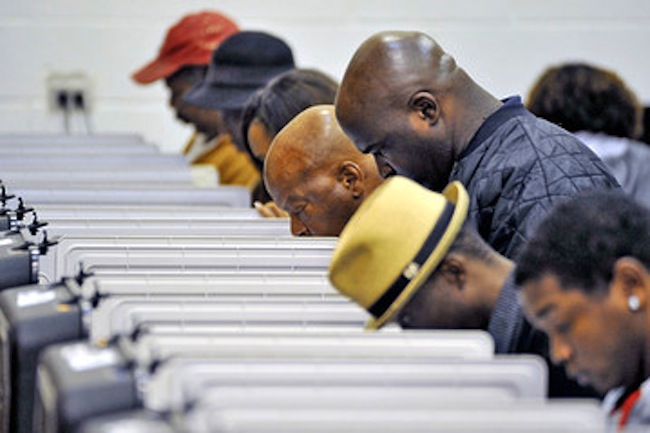According to a recent report released by Black Voters Matter and the Stacey Abrams founded Fair Fight Action the Republican party’s current gerrymandering power grab, combined with a ruling striking down Section 2 could help secure an additional 27 U.S. House seats for Republicans – at least 19 directly tied to the loss of Section 2 of the Voting Rights Act. It’s enough to cement one-party control of the U.S. House for at least a generation.
Although as of today, Wednesday, Oct. 22, the Supreme Court has not handed down what many fear may be the final nail in the Voting Rights Act coffin via the State of Louisiana v. Callais case, reports from those close to the case indicate that the conservative court is leaning toward coming down on the side of the “non-African American” plaintiffs. That decision would effectively gut what is left of the Voting Rights Act of 1965 which was severely weakened by the court’s 2013 decision to strike down Section 5 of the VRA which required states with histories of voter suppression to get federal approval before changing voting laws.
If the plaintiffs in the current case prevail, Section 2 of the VRA which provides for redistricting actions to create more racially equitable voting districts to remedy past discriminatory practices would be eliminated. Essentially election map practices that increase majority white voting districts and limit the number of majority Black voting districts would be allowed to unfairly influence and impact election outcomes.
“This is about more than lines on a map – it could decide whether millions of Black, Latino, and other voters of color still have a voice in our representative democracy. We’re watching the GOP advance to the endgame of a decades-long strategy to dismantle the Voting Rights Act and lock in their own power. If Section 2 is struck down, the Court will be dragging us back to a pre-1965 America where racist maps blocked entire communities from having fair political representation,” said Lauren Groh-Wargo, Fair Fight Action CEO
The Louisiana case stems from a federal court ruling that Louisiana’s 2022 map — with only one majority-Black district — although Black residents make up one-third of Louisiana’s population. In response, the legislature passed a bill as ordered by the lower court to add a second majority-Black district.
In the 2022 lawsuit filed by the ACLU and other groups arguing that the state’s congressional map illegally “packed” Black voters into a single district to diminish their collective voting power, was deliberately designed to dilute the Black vote.
The non-African American opponents in the current case argue the new map providing for a second Black district is an unconstitutional racial gerrymander.
Limited voting rights oversight under the Trump administration have however created a loophole where partisan gerrymandering is used as a cover for racial gerrymandering, since race and party affiliation are often linked as we have seen in Texas, North Carolina, Illinois and other states issuing mandates to reshape voting access and district maps.
In Georgia, where Trump pursued unsubstantiated claims of voter fraud and directed Georgia Secretary of State Brad Raffensberger to find an additional 11,000 votes to win the 2020 election, he fought to shift focus away from civil rights enforcement and enable Republicans ability to dismantle minority districts.
While the case directly concerns the Louisiana redistricting map, an unfavorable ruling will set a precedent for how Section 2 of the Voting Rights Act is enforced nationwide.
The fallout of the Supreme Courts decision in Louisiana will decimate voting protections around the country, but in particularly Georgia which was at the center of the push to overturn the election results after Trump lost to Biden.
Striking down Section 2 of the VRA will ultimately pave the way for a similar power grab to succeed with the dissolution of majority-minority districts. The result of this action will reduce the number of Black representatives in the Georgia state legislature and ultimately the number of Black representative and Democrats in the U.S. House of Representatives.
Recent legal challenges to voting districts in Georgia have primarily focused on alleged racial gerrymandering and voter dilution, violating Section 2 of the VRA. While a federal court ordered new maps in 2023, challenges to the remedial maps are still being litigated
In early October of this year the Georgia NAACP and the civil rights organization Advancement Project filed a federal lawsuit in Merriweather County challenging the 2022 county commission district maps. The suit charges that the maps illegally dilute the voting power of Black residents and have resulted in an all-white county commission.
An anti-VRA ruling would also nullify the historic 2021wins by Sens. Raphael Warnock and Jon Ossoff which in 2021 gave Democrats control of the U.S. Senate. Progress under the state’s current leadership will be rolled back to pre-1965 voting and election practices, returning Georgia to a solidly red Republican stronghold.
Civil rights groups have raised concerns since the first Trump administration that judges appointed to the Supreme Court and nominees with records of fighting against voting rights would support and defend unconstitutional racial gerrymanders.
They were right.
Note on Oct. 15 Justice Clarence Thomas opposed the decision to reargue the Louisiana v. Callais case, emphasizing the Court’s duty to resolve redistricting challenges promptly, although the case was brought in March of 2025.


